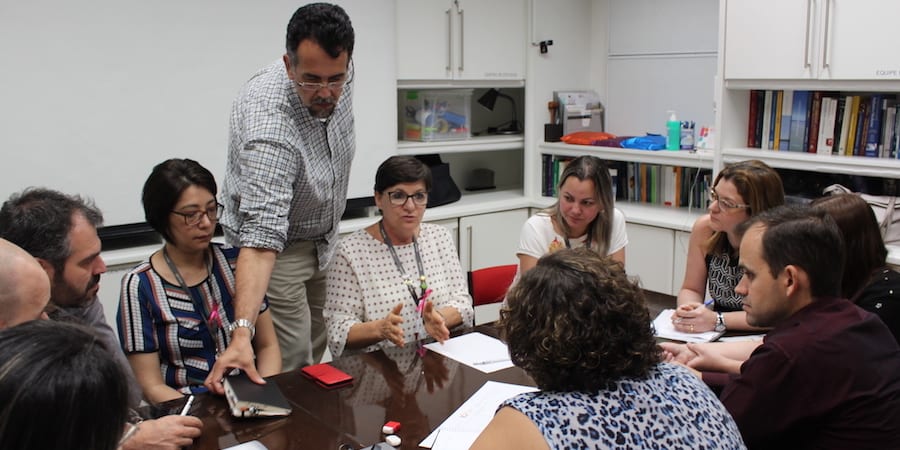
How an English council transformed itself with lean thinking
CASE STUDY - In November last year, a town in the West Midlands made the headlines after a survey named it the best place to live in the United Kingdom. Lean may not be directly responsible for the achievement, but there is little doubt it gave its contribution.
Words: Roberto Priolo
Interviewees: Phil Mayhew, Kim Silcock
There is a good chance that if you are reading this article from anywhere outside the UK you will have no idea of where Solihull is.
This is a town of just 200,000 people, located between Birmingham and Coventry, in the West Midlands of England.
It may not be Britain’s best-known spot, but Solihull certainly has a lot to boast about, starting with its enviable geographical location and its citizen-focused local government.
In November 2013 a survey found Solihull to be the place with the highest quality of life in the UK. Could this be, at least in part, the result of efficient and forward-looking local government that wants to improve the lives of Silhillians by delivering better services?

THE CITY
The city lies close to Birmingham International Airport (which is actually within its limits), the NEC exhibition center, a Land Rover manufacturing site, and a number universities and business parks. It’s right in the middle of what is known as the “M42 corridor”.
Phil Mayhew, Director of Business Transformation, said: “Solihull is the fastest growing part of the West Midlands economy. This is an attractive place for businesses and people to move to – we have good schools and services, great connections to the region and the rest of the UK, high disposable incomes, and so on. Surveys are just surveys, but I think the council has indeed contributed to making Solihull a better place to live in.”
As one of the lowest funded metropolitan borough councils in the UK, Solihull has always looked for ways to boost efficiency and effectiveness in its operations, according to Phil Mayhew, Director of Business Transformation.
The first push towards actual lean thinking came in 2006, when the council completed a pilot with social work services around fostering and adoptions. At that stage, the aim was to identify tools that would increase the efficiency of the services the council provided.
In took another three years, and a break, for the council to move to the next step: the appointment of Mark Rogers as chief executive of the MBC marked the beginning of a phase during which the council worked to develop lean capacity around the organization.
This was also when a new team, led by Kim Silcock, Head of Lean Transformation, was formed.
In that time, from early 2009 to the end of 2010, however, Solihull focused excessively on savings.
According to Silcock, at the beginning of the economic downturn, the council was very financial results-driven, which eventually turned out to be counterproductive to embedding lean in its operations. Demonstrating return on investment had wrongly become the main focus of any lean activity.
She recalls: “I remember sitting at a review with a manager, who had a specific saving target associated to their team. We went through the whole process of going see, looking at what they were doing, understanding the data and seeing how work could be improved. Towards the end, however, the manager hinted to the fact that the financial result had been achieved and that he thought that’d be enough to meet the requirements of the management team. All the work we were doing in improvement was okay, but keeping it linked to financial results made people think that so long as they gave us the money we’d leave them alone.”
Mayhew added: “It was at that point that we realized that the harder we tried to chase the money, the further away it got! We then turned to a more cultural, long-term intervention based on people and purpose, which would have a deeper impact.”
THE CURRENT STATE
The West Midlands region is going through vast and quick change. Already blessed with great connections to the rest of the UK, the region is set to grow even further, with plans to expand Birmingham International Airport and the potential for a high speed HS2 line railway station to be built nearby.
There are predictions for around 100,000 new jobs in the Birmingham-Solihull area in the near future. However, complacency doesn’t seem to be on the council’s agenda.
Solihull Metropolitan Borough Council currently has three main strategic objectives to which its actions and lean efforts are directed: health and well-being of citizens, the creation of a strong and sustainable communities, and economic growth for the area.
Internally, it’s the Solihull Way that guides it. Mayhew confirmed: “It’s quite simply the way we do things around here. The Solihull Way is our internal organizational development program, which is deeply rooted in lean and represents the way the councils meets all its objectives.”
The program has a very strong focus on policy deployment, which has the distinct advantage of helping the organization to understand what the next steps that must be taken are, with a strategy always clear in mind.
Silcock explained: “We were being very specific as to what we wanted to achieve over three years. Policy deployment helps you to know what your objectives are and drives you to think what you can do now to get there.”
She also shared an example of what policy deployment meant to her: “In the plan I was drawing, I said we were going to train all of our 3,000 staff in lean and we’d get everybody believing in lean in a year. I genuinely believed we could do that, until my colleagues asked me how I’d get around training everybody in a year, let alone making them all believe. It made me realize it was just impossible and forced me to think what I could do in a year, and how many people I could actually get involved in a program. Policy deployment really helped us to deliver against tough targets, by giving us more realistic and precise goals to focus on.”
THE DEVELOPMENT OF PEOPLE
Solihull does not have one way to develop its people.
Formal training and qualifications are complemented with on the job training. There is also a lot of information available on the intranet, and courses on specific techniques are made available to those who need them.
In addition, the organization has recently launched a new induction program for all staff.
This is the result of several iterations, most of which involved presentations in a room. This meant, according to Silcock, that the program didn’t have the desired impact. “We want people to behave the Solihull Way and look for improvements from the moment they start working with us,” she said. “Today the induction program lasts three days, during which each new employee goes through an introduction to the Solihull Way and then goes out into the business to see it in action. Each new member of staff now has a mentor and is expected to work on one improvement project.”
The new approach is time-consuming, but its being customized to each employee’s needs ensures enthusiasm is kept alive. According to some of the feedback the lean team has received, what people value the most about the new program is that they know from the very beginning where the organization is going.
The Solihull approach to people development is flexible. The council is currently trying to create a matrix to make sure that each team across the organization is getting access to at least one of the development opportunities on offer. “It’s very much like a restaurant menu – and we want everybody to pick something from that menu,” Mayhew explained.
This “menu” is developed by an organizational development group, whose activities are complemented by those of the so-called “business changers”, nine experts who act as facilitators.
They have been through practical lean practitioner training and also learned from external organizations that paid Solihull a visit and taught them new techniques.
A customized course delivered by Cardiff University also contributed to shifting Solihull’s thinking and gearing it towards purpose, customer and culture.
The people who joined the original team of business changers were carefully selected: they represented a cross-section of the business, but this was only incidental, as the main criteria management was after at that stage was attitude towards getting things done and change. This was right before the first major round of lean training, and it was critical to identify the right people. More than anything, they had to think differently.
Resources were necessary in order to recruit these professionals.
Mayhew said: “The business case for that first team was around the point that we have lots of expertise in the organization, in several fields, from finance to human resources, but we had no expertise in service design.” Senior leadership recognized this need for a team enrielt dedicated to lean, which reflected the business’ commitment to change, and made the necessary funds available. In a couple of years, the investment proved very sound.

THE IMPROVEMENT OF PROCESSES
“Most councils’ plans tend to focus on the same issues, from looking after people to making communities safer, and goals also tend to flow with political mandates. What we have done is becoming more and more precise on how we deal with these issues,” Mayhew explained.
Working with teams to analyze processes and come up with a more efficient way to deliver value to customers brought great improvements to Solihull Metropolitan Borough Council. Because the review and improvement of processes happens organically at the council, priorities change every year. Right now they are, for example, focused on children’s services.
The approach that Solihull adopts is increasingly based on value streams. One of them is “early help” (which is based on the assumption that intervening in an individual’s life at the earliest possible stage can prevent problems, and therefore service requirements, in the long term), another is the employee journey at the council, from the time they are recruited onwards.
Work is also under way in the service area of the business, specifically in contracting and commissioning, which of course spans several departments within the organization.
Solihull’s way to deliver improvement has become more holistic over time, as demonstrated, for example,by the successful experiments that were carried out while redesigning pathways for adult social care.
In 2003 the UK government introduced the so-called Section 5, a provision requiring social services authorities to make payments in cases where the discharge of patients is delayed for reasons related to the provision of services.
In other words, if a bed is kept occupied for a certain period of time after a patient can be discharged for reasons related to the local authority underperforming, it will be up to that local authority to fork out the money.
It’s easy to imagine why tackling this problem became a priority for the council: finding people a place to stay after they leave the hospital can take a long time, and nobody wants to spend money if they don’t have to.
Refreshingly, Solihull’s response to the issue was to sit down with the local hospital.
Silcock said: “It really is all about flow… or lack of flow in this case. We looked at the patient pathway together with the hospital, trying to figure out what was getting in the way. We agreed on getting the social worker to talk to the nurses to get discharged people out as soon as possible. The new process we put in place created a completely different experience for the customer and for the staff, who started to feel more in control.”
Come to think of it, it is likely that the hospital itself was quite pleased with this newly-acquired ability to free up beds more quickly. And why wouldn’t it? Free beds are one of the number one problems for hospitals the world over.
Another interesting piece of work that the council contributed to is the regeneration of North Solihull, a deprived area that in the past few years has seen the construction of new village centers (local amenities) and investment towards schools, employment opportunities, etc.
People in different areas have different needs, and this is reflected in the work performed by the local authority across the council. The role of government is to manage growth in areas like North Solihull, and lean has helped greatly in this sense.
Silcock said: “To give an example, contact service is based in the north, where people are more in need and the majority of the clients of adult care live. We have transferred some services over there and used lean to look at what could stay and what had to be transferred. At the end of the day, it’s about getting the right people in the right place.”

VISIBLE LEADERSHIP
It’s not a secret that getting management involved is fundamental if lean is to succeed.
Solihull has devised a way for the leadership team to take an active role in the implementation of lean and the search for continuous improvements: the “teachable point of view”.
Leaders at Solihull are encouraged to go out in the organization and talk about the Solihull Way in their own experience, by telling what it means to them through their own stories. “We all need to learn a different way of leading, where leaders are teachers,” confirmed Mayhew.
The overarching goal of Solihull MBC is improving its services to change the lives of citizens. This is echoed by the words of CEO Mark Rogers: “Lean suits Solihull because it focuses on customer value, which fits perfectly with our philosophy of putting lives before services. A cultural benefit of the approach has been the slow but sure development of the organization’s understanding of putting our customers first.”

Read more


FEATURE – To successfully transform, we need to change our “theory of success”. The authors discuss the obstacles managers face along the way.


INTERVIEW – Top leaders at Chilean company Elecmetal talk to us about how lean has transformed their role in the organization and how capability development is fuelling change.


WOMACK’S YOKOTEN – After a road trip from Boston to Philadelphia driving Toyota’s hydrogen fuel-cell Mirai, Jim reflects on lean and green and why the two are not necessarily the same.


VIDEO - The CEO of a cancer center in Brazil gives us a tour of the their obeya room, taking us through their strategy deployment and explaining how it supports their mission of reducing the burden of cancer.

